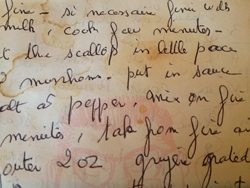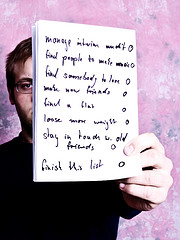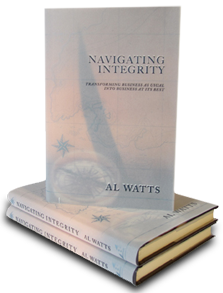 We pulled out a time-honored family recipe over the holidays, and that got me thinking about what a recipe for success in 2012 might be. I tried to follow the criteria for most good recipes: they should be relatively simple and clear, employ what is ideally at our disposal, allow for some flexibility or minor errors, and yield the desired outcomes. Here’s what I came up with:
We pulled out a time-honored family recipe over the holidays, and that got me thinking about what a recipe for success in 2012 might be. I tried to follow the criteria for most good recipes: they should be relatively simple and clear, employ what is ideally at our disposal, allow for some flexibility or minor errors, and yield the desired outcomes. Here’s what I came up with:
Start with the end in mind. What are the outcomes that we want? Where do we see ourselves ideally in 2013? What’s new; what’s different? Why is that important – how will the outcomes advance our longer-range vision and goals?
Take inventory. What resources do we already have on hand that we can employ – friends, contacts, materials, assets . . .? Which will we need to acquire? This step is like a basic navigational principle: before we can get to where we want to go, we need to first know where we are – and it’s critical to be accurate. If we take on a complicated recipe from a renowned chef, and it’s in a foreign language, the chances of failure are high. Stretch goals are great, but we need to be realistic. Before we set out we need to see things for what they are, not what we wish they were.
Follow a plan, but be flexible. Think through which steps, in what order, will give us the best chances of success. For example, just like I know that the chocolate chips get added last when making  chocolate chip cookies, it’s better to research a prospect before making a marketing call. If I’m out of chocolate chips, maybe I can use chocolate shavings or peanut butter chips; if I haven’t done the research yet, maybe I can reschedule.
chocolate chip cookies, it’s better to research a prospect before making a marketing call. If I’m out of chocolate chips, maybe I can use chocolate shavings or peanut butter chips; if I haven’t done the research yet, maybe I can reschedule.
Ask for help. I tried a recipe once that called for white sauce, and had no idea what that was. Instead of wasting a lot of butter and flour or scratching the project, I asked my wife Carley for help. If an associate knows some part of what I need to deliver better than I do, I would rather pay for the help than jeopardize project quality.
Monitor progress and ask for feedback. Even a good cook is smart to get others’ opinions about whether to add any spices or serve something again. Likewise, we are not always the best judge of our work or efforts; take advantage of others’ ideas or suggestions of ways to approach things differently.
Stir in equal amounts of courage and discipline. Almost anything that’s new or hard requires courage. We need courage to follow our own path, try something new or untested or make investments when rewards are uncertain. Discipline essentially means replacing old habits or routines with new ones, and sticking to them; without it we are likely to be among the 80% or so who drop their new year resolutions by the end of January. As Aristotle said: “We are what we repeatedly do. Excellence, then, is not an act, but a habit.”
Hang in there, and be good to yourself. Challenging goals (or recipes) can be discouraging; sometimes we’re tempted to just chuck it all and eat out. Keep at it, and “keep your eye on the prize.” If we keep doing our best, something positive will develop; if nothing else we will learn something. Stay focused, but remember “all work and no play . . .” Put on some music, have a glass of wine, visit with company (or the equivalent at work) and keep things in perspective. Even if all seems lost, it’s not.
 That’s my take on a recipe for success in 2012; what’s yours?
That’s my take on a recipe for success in 2012; what’s yours?
“The secret of success is constancy to purpose.”
Benjamin Disraeli
“When you get right down to the root meaning of the word “succeed”, you find that it simply means to follow through.”
F. W. Nichol







Hi Al
Great post, it can get a lot of people moving. I like it that you incorporate minor errors, the need for flexibility and the importance of courage and discipline, often overlooked when it comes to execution. And that’s what it’s all about, right.
I’m looking forward to our meeting, wishing you an inspiring and productive remainder of the week,
Carolien Moors, Organizational trainer/coach/speaker/blogger
Blog on Change, Leadership, Personal Development, Twitter:cmoors, LinkedIn